Podcast: Play in new window | Download (Duration: 9:13 — 6.5MB) | Embed
Subscribe: Apple Podcasts | Spotify | Amazon Music | Android | Pandora | iHeartRadio | JioSaavn | Podchaser | Gaana | Podcast Index | Email | TuneIn | Deezer | Anghami | RSS | More
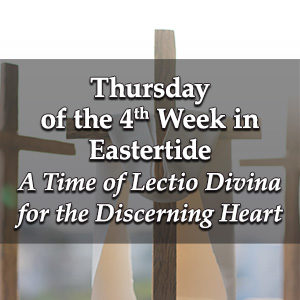 Thursday of the Fourth Week of Eastertide – A Time of Lectio Divina for the Discerning Heart Podcast
Thursday of the Fourth Week of Eastertide – A Time of Lectio Divina for the Discerning Heart Podcast
As you begin, take a deep breath and exhale slowly. For at least the next few moments, surrender all the cares and concerns of this day to the Lord.
Say slowly from your heart “Jesus, I Trust In You…You Take Over”
Become aware that He is with you, looking upon you with love, wanting to be heard deep within in your heart…
From the Holy Gospel According to St. John 13:16-20
After he had washed the feet of his disciples, Jesus said to them:
‘I tell you most solemnly,
no servant is greater than his master,
no messenger is greater than the man who sent him.
‘Now that you know this, happiness will be yours if you behave accordingly. I am not speaking about all of you: I know the ones I have chosen; but what scripture says must be fulfilled: Someone who shares my table rebels against me.
‘I tell you this now, before it happens,
so that when it does happen
you may believe that I am He.
I tell you most solemnly,
whoever welcomes the one I send welcomes me,
and whoever welcomes me welcomes the one who sent me.’
What word made this passage come alive for you?
What did you sense the Lord saying to you?
Once more give the Lord an opportunity to speak to you:
After he had washed the feet of his disciples, Jesus said to them:
‘I tell you most solemnly,
no servant is greater than his master,
no messenger is greater than the man who sent him.
‘Now that you know this, happiness will be yours if you behave accordingly. I am not speaking about all of you: I know the ones I have chosen; but what scripture says must be fulfilled: Someone who shares my table rebels against me.
‘I tell you this now, before it happens,
so that when it does happen
you may believe that I am He.
I tell you most solemnly,
whoever welcomes the one I send welcomes me,
and whoever welcomes me welcomes the one who sent me.’
What did your heart feel as you listened?
What did you sense the Lord saying to you?
Once more, through Him, with Him and in Him listen to the Word:
After he had washed the feet of his disciples, Jesus said to them:
‘I tell you most solemnly,
no servant is greater than his master,
no messenger is greater than the man who sent him.
‘Now that you know this, happiness will be yours if you behave accordingly. I am not speaking about all of you: I know the ones I have chosen; but what scripture says must be fulfilled: Someone who shares my table rebels against me.
‘I tell you this now, before it happens,
so that when it does happen
you may believe that I am He.
I tell you most solemnly,
whoever welcomes the one I send welcomes me,
and whoever welcomes me welcomes the one who sent me.’
What touched your heart in this time of prayer?
What did your heart feel as you prayed?
What do you hope to carry with you from this time with the Lord?
Our Father, who art in heaven,
hallowed be thy name.
Thy kingdom come.
Thy will be done on earth, as it is in heaven.
Give us this day our daily bread,
and forgive us our trespasses,
as we forgive those who trespass against us,
and lead us not into temptation,
but deliver us from evil.
Amen


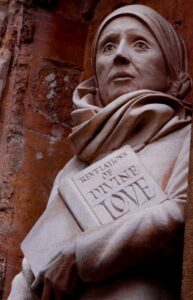
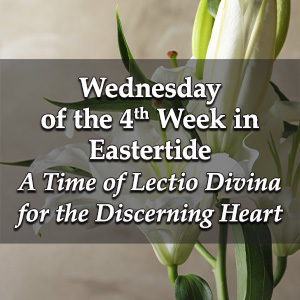 Wednesday of the Fourth Week of Eastertide – A Time of Lectio Divina for the Discerning Heart Podcast
Wednesday of the Fourth Week of Eastertide – A Time of Lectio Divina for the Discerning Heart Podcast
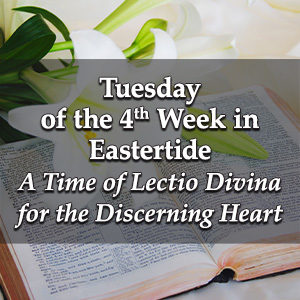 Tuesday of the Fourth Week of Eastertide – A Time of Lectio Divina for the Discerning Heart Podcast
Tuesday of the Fourth Week of Eastertide – A Time of Lectio Divina for the Discerning Heart Podcast
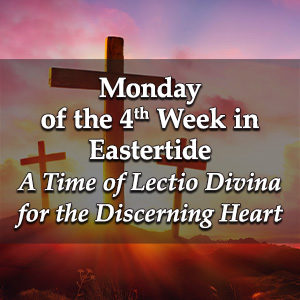 Monday of the Fourth Week of Eastertide – A Time of Lectio Divina for the Discerning Heart Podcast
Monday of the Fourth Week of Eastertide – A Time of Lectio Divina for the Discerning Heart Podcast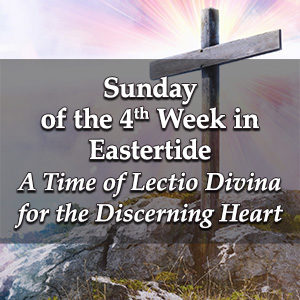 Sunday of the Fourth Week of Eastertide – A Time of Lectio Divina for the Discerning Heart Podcast
Sunday of the Fourth Week of Eastertide – A Time of Lectio Divina for the Discerning Heart Podcast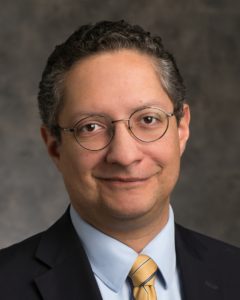
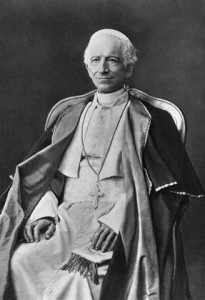 About Pope Leo XIII
About Pope Leo XIII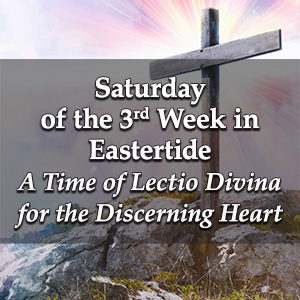 Saturday of the Third Week of Eastertide – A Time of Lectio Divina for the Discerning Heart Podcast
Saturday of the Third Week of Eastertide – A Time of Lectio Divina for the Discerning Heart Podcast